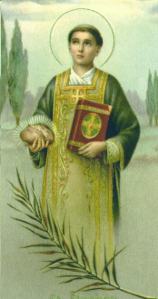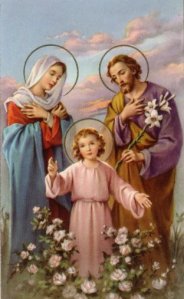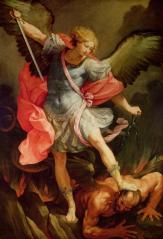
St. Stephen
Feast Day of St. Stephen, First Martyr
Stephen, one of the seven deacons chosen by the Apostles amongst the most pious and holy disciples to help them, received from them mission to organize the meals where the poor were fed in common. St. Stephen was renowned for his virtues and worked such great wonders and signs among the people that the Jews from five different synagogues became alarmed and summoned him before the Sanhedrin. The Jews stoned this holy deacon, who invoked our Lord, saying: “Lord Jesus, receive my spirit…Lord, lay not this sin to their charge.” His name is inscribed in the Canon of the Mass.
– From The Roman Catholic Missal, 1962
Collect
Dan obis, quaesumus, Domine, imitari quod colimus; ut discamus et inimicos diligere; quia ejus natalitia celebramus, qui novit etiam pro persecutoribus exorare Dominum nostrum Jesum Christum Filium tuum Qui tecum vivit et regnat.
Grant us, we beseech Thee, O Lord, so to imitate what we revere, that we may learn to love even our enemies: for we celebrate the heavenly Birthday of him who knew how to pray for his very persecutors to our Lord Jesus Christ, Thy Son: Who with Thee liveth and reigneth.
Epistle (Acts 6:8-10; 7:54-59)
St. Stephen, stoned by the Jews, asked pardon for his persecutors.
In those days Stephen, full of grace and fortitude, did great wonders and signs among the people. Now there arose some of that which is called the synagogue of the Libertines and of the Cyrenians and of the Alexandrians and of them that were of Cilicia and Asia, disputing with Stephen. And they were not able to resist the wisdom and the spirit that spoke. Now hearing these things, they were cut to the heart and they gnashed with their teeth at him. But he, being full of the Holy Ghost, looking up steadfastly to heaven saw the glory of God and Jesus standing on the right hand of God. And he said: Behold, I see the heavens opened, and the Son of man standing on the right hand of God. And they crying out with a loud voice stopped their ears and with one accord ran violently upon him. And casting him forth without the city, they stoned him; and the witnesses laid down their garments at the feet of a young man, whose name was Saul. And they stoned Stephen, invoking, and saying: Lord Jesus, receive my spirit. And falling on his knees, he cried with a loud voice, saying: Lord, lay not this sin to their charge. And when he had said this, he fell asleep in the Lord.
Gospel (Mt. 23:34-29)
Jesus had upbraided the Jews for having killed and stoned the prophets. Our Lord foretold to the Apostles their martyrdom for His name’s sake. The Jews fulfilled the words of the Savior, and Stephen is the first of the witnesses of Christ.
At that time Jesus said to the scribes and Pharisees: Behold I send to you prophets and wise men, and scribes, and some of them you will put to death and crucify, and some you will scourge in your synagogues, and persecute from city to city: That upon you may come all the just blood that hath been shed upon the earth, from the blood of Abel the just, even unto the blood of Zacharias the son of Barachias, whom you killed between the temple and the altar. Amen I say to you, all these things shall come upon this generation. Jerusalem, Jerusalem, thou that killest the prophets and stonest them that are sent unto thee, how often would I have gathered together thy children, as the hen doth gather her chickens under her wings, and thou wouldest not? Behold, your house shall be left to you, desolate. For I say to you, you shall not see Me henceforth till you say: Blessed is He that cometh in the name of the Lord.
Read Full Post »




Christmas, Catholics, Pagans, and Atheists – Oh, My!
Posted in Christmastide, Commentary, Feast Day, Martyrs, Theology, tagged 25, Annunciation, Atheist, Catholic, Christian, Christmas, Christmastide, Commentary, Conception, Constantine, Date, December, Doctor of the Church, Dwight Longenecker, Easter, Empire, Faith, Fathers of the Church, Feast Day, God, Halloween, History, How Chritsmas Began, Jesus, Jewish, John Chrysostom, Judaism, Julian, Liturgy, March, Martyrs, Nativity, New Age, Origin, Pagan, Protestant, Real Origins of Christmas, Roman, Rome, Saturn, Saturnalia, Sol Invictus, Theology, Tradition, Truth, Virgin Mary on December 23, 2011| Leave a Comment »
"Adoration of the Shepherds" by Gerard van Honthorst, 1622 (Image: Wikimedia Commons)
Ah, yes, Christmas, that time of year with a winter nip in the air (unless you live in parts of Florida where record highs in the 80s are forecast this weekend) and the time of year when the thoughts of old school Protestants (meaning those few Protestants who still find the need to base their beliefs on a militant anti-Catholicism), New Age “pagans,” and militant atheists turn yet again to the supposed “pagan” origins of Catholicism. Along with Easter and Halloween, the Feast of Christmas is yet another of those celebrations we are told “prove” the pagan origins of Catholicism. After all, everyone knows Christianity in general and Catholicism in particular are nothing more than “dressed up” paganism. It’s just too bad everyone is wrong…
Instead of merely reposting my piece on the true, non-pagan, origins for the December 25th date of Christmas, I share this link to a wonderful piece by Rev. Dwight Longenecker which does an excellent job of explaining (yet again) once and for all the true background of the Christian celebration of Christmas on December 25th.
Allow me to highlight a few points from Rev. Longenecker:
1. The “pagan origin” claimants begin with the capital mistake of assuming that mere resemblance proves causality. Simply because two things resemble each other does not mean one is the cause of the other. Two things can be strikingly similar yet share absolutely no causal relationship what-so-ever. Simply because Christians and pagans observed certain feasts at similar times throughout the year does not mean one automatically caused the other.
2. The Roman feast most often associated with Christmas by the “pagan originists” is Saturnalia, a Roman feast for the god Saturn which was held from December 17 to 23. However, this feast, while occurring on the wrong date (if Christianity “co-opted” this feast, why not make the date of Christmas December 17th to really sock it to those pagans?), also had nothing to do with the imagery of the solstice and the return of the sun. The focus of this feast centered more on the theme of sacrifice-to-appease-the-gods-for-a-good-harvest.
3. The Roman feast associated with the solstice was Dies Natalis Sol Invictus. The only problem here is the inconvenient fact that this feast wasn’t instituted until around AD 278, well after the spread of Christianity throughout the Roman Empire, and for quite some time remained a rather minor feast with a small cult. Further, we find no evidence that Sol Invictus was celebrated on December 25th until AD 360 – decades after Emperor Constantine’s conversion to Christianity in AD 315. In fact, the promotion of the feast was due to the influence of Julian the Apostate who attempted to turn back the tide of Christianity sweeping the Empire. Huh, so that means Sol Invictus was used by the Roman authorities in an attempt to “win back” Christians to paganism, not the other way around.
4. The “pagan origins” nonsense completely ignores the fact that thousands (some sources say millions) of Christians lost their property and in many cases their lives over their complete refusal to, as Rev. Longenecker puts it, “offer so much as one grain of incense to the pagan gods.” Yet, the “pagan originists” would have us believe the very people who were giving their lives over refusal to participate in anything even resembling paganism suddenly decided to “co-opt” pagan festivals.
5. If we actually take time to read the historical record provided us in the writings of the early Church Fathers, we find a clear answer as to why Christmas is celebrated on December 25th. As early as AD 386, we find a sermon by St. John Chrysostom linking the date of Christmas to the date of the Annunciation (the day the Angel Gabriel announced to Mary that she would conceive and give birth to Jesus). The wording of his sermon suggests this linking was already a long-accepted tradition within the Church. We need to remember early Christians were primarily Jewish converts and thus the roots of Christianity are in Judaism, not Romanism. The Jews believed the world began on March 25th. They also believed great men died on the same date as the date of their conception. Therefore, we find the early Christians believed the date of Jesus’ conception was March 25th. Let’s count nine months and see what we find: December 25th.
So, just as I pointed out last time, the date of Christmas has nothing to do with Romans or paganism, but everything to do with early Jewish belief and the dating of Jesus’ conception by early Christians.
Merry Christmas!
Share this:
Read Full Post »